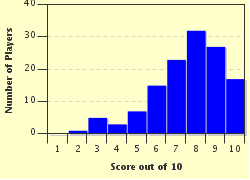Quiz Answer Key and Fun Facts
1. 'Children of the Heavenly King' was sung in the 1942 Academy Award winning movie 'Mrs. Miniver'. Who was Mrs. Miniver?
2. 'Art Thou Weary, Art Thou Languid?' was sung in the Academy Award winning film 'Our Town'. It was the same year Winston Churchill became prime minister of Great Britain, the evacuation of British soldiers from Dunkirk took place and the Summer Olympics were cancelled. What was the year?
3. 'In the Garden' was sung in the 1984 film that starred Sally Field who won an Academy Award for Best Actress. What was the name of the film?
4. 'Fight the Good Fight' was sung in the Academy Award winning film 'Chariots of Fire'. The film was released the same year Egyptian president Anwar el-Sadat was assassinated, Pope John_Paul was wounded by a gunman and the United States welcomed home fifty-two hostages freed in Tehran, Iran. What was the year 'Chariots of Fire' was released?
5. 'Guide Me O Great Jehovah' was sung in Welsh in the Academy Award winning film 'How Green Was My Valley' in 1941. What was the movie about?
6. A mathematics question: 'Shall We Gather at the River' was written by Robert Lowry, who also composed the music, in 1864. One hundred and twenty-one years later it was sung in the Academy Award winning film 'Trip to Bountiful'. What year was 'The Trip to Bountiful' released?
7. 'Softly and Tenderly Jesus is Calling' was also sung in the Academy Award winning film 'The Trip to Bountiful'. In the film, Bountiful was a fictitious town. According to the film, where was Bountiful?
8. 'Old Time Religion' was sung in the Academy Award winning film 'Sergeant York' in 1941. Who starred as Sergeant York?
9. The hymn 'Nearer, My God, to Thee' was played instrumentally in the 1997 Academy Award winning film 'Titanic'. However, it was also sung at the end of a 1936 Academy Award nominated film about a city on the West Coast of North America that suffered a major disaster in the early 1900s. What was the name of the film?
10. What hymn written by famous American hymn writer Fanny Crosby was sung in two different Academy Award winning films in back-to back years in the 1980s?
Source: Author
Cowrofl
This quiz was reviewed by FunTrivia editor
agony before going online.
Any errors found in FunTrivia content are routinely corrected through our feedback system.

